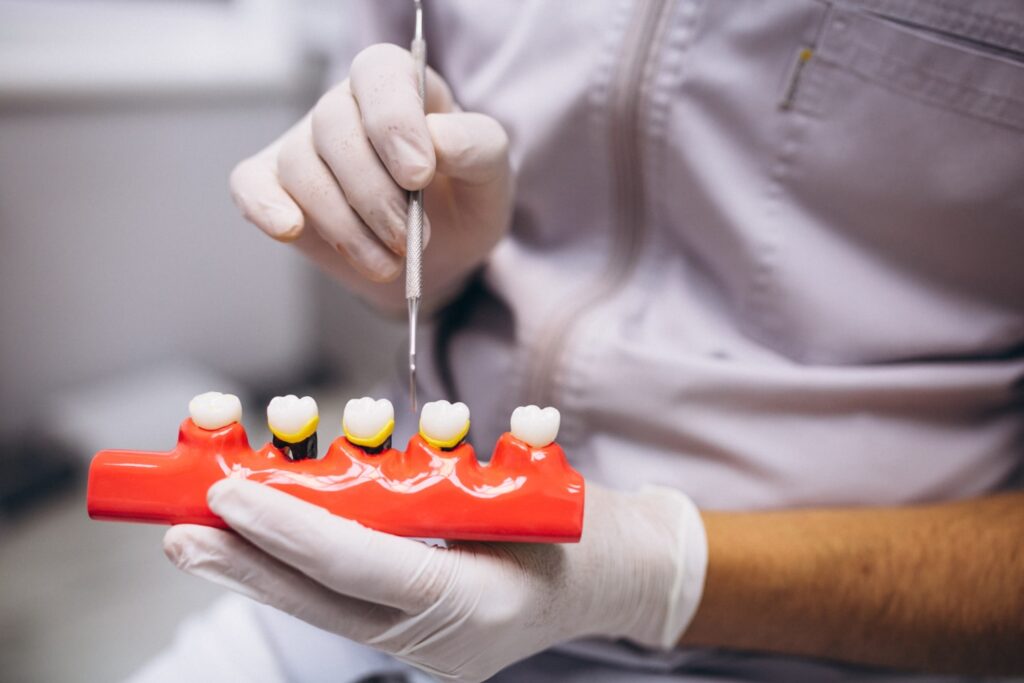When it comes to restoring damaged or missing teeth, dental crowns are one of the most effective solutions. Whether due to tooth decay, injury, or cosmetic concerns, dental crowns offer long-lasting and aesthetically pleasing results. If you’re searching for “dental crowns near me,” this comprehensive guide will walk you through everything you need to know about dental crowns, including different types, the process, and the best options for your needs.
What Are Dental Crowns?
A dental crown is a protective covering placed over a tooth to restore its shape, size, strength, and appearance. Crowns encase the entire tooth and are designed to mimic the natural look and function of your teeth. They can be made from various materials, including porcelain, metal, or a combination of both. Crowns are often recommended for teeth that have been severely damaged or weakened due to tooth decay, fractures, or large fillings.
Why You Might Need A Dental Crown
There are several reasons why a dentist may suggest a dental crown:
Restoring a damaged tooth: Teeth that are broken, cracked, or weakened by decay often need crowns to prevent further damage.
Completing a dental implant: Dental implants are often paired with crowns to replace missing teeth, ensuring both functionality and appearance.
Supporting dental bridges: Dental bridges often use crowns on adjacent teeth to support the artificial tooth in the middle.
Improving cosmetic appearance: Crowns can be used in cosmetic dentistry to enhance the look of discolored or misshapen teeth.
Types Of Dental Crowns
There are several types of dental crowns available, each suited to different needs and preferences. Here’s a look at the most common ones:
1. Porcelain-Fused-to-Metal Crowns
Porcelain-fused-to-metal crowns are a popular choice because they combine the strength of metal with the natural look of porcelain. The metal provides durability, while the porcelain coating ensures that the crown blends seamlessly with your natural teeth. These crowns are typically used for back teeth where strength is needed.
2. Zirconia Crowns
Zirconia crowns are incredibly strong and durable. They are a top choice for people looking for a metal-free option that still provides strength and a natural appearance. Zirconia crowns are resistant to chipping and are often used for molars or other teeth that endure high pressure from chewing.
3. Gold Crowns
Gold crowns have been used in dentistry for many years due to their durability and long lifespan. While not as aesthetically pleasing as porcelain crowns, gold crowns are still preferred by some patients for their longevity and biocompatibility. They are often used for back teeth, where appearance may not be as crucial.
4. Temporary Crowns
Temporary crowns are used as a short-term solution while you wait for your permanent crown to be made. These crowns are usually made of acrylic or stainless steel and are placed to protect your tooth while the final restoration is crafted. Your dentist will ensure the entire process runs smoothly, with a temporary crown placed after the initial tooth preparation.
The Process Of Getting A Dental Crown

If you’re wondering about the entire process of getting a crown, here’s a step-by-step breakdown:
1. Initial Consultation
Your journey begins with an initial consultation with your dentist. During this appointment, your dentist will examine your teeth and discuss your options. If a crown is deemed necessary, your dentist will explain the different types of crowns and help you choose the best option for your needs, whether that’s a zirconia crown, porcelain-fused crown, or gold crown.
2. Tooth Preparation
During your next visit, the dentist will prepare your tooth by removing any decayed or damaged portions. If your tooth has undergone root canal therapy, this step is crucial for ensuring the tooth can support the crown. After preparation, your dentist will take impressions of your tooth, which will be used to create your custom crown.
3. Temporary Crown Placement
In most cases, you’ll receive a temporary crown after the tooth preparation. This crown will protect your tooth while the permanent crown is being made. Though temporary crowns aren’t as durable as permanent ones, they provide necessary coverage to prevent sensitivity and protect the tooth from further damage.
4. Permanent Crown Placement
Once your permanent crown is ready, you’ll return to the dentist for the final fitting. Some award-winning dentists Dr offer same-day crowns with advanced technology, allowing you to complete the process in just one visit. For traditional methods, you’ll come back for a second appointment where the crown will be cemented into place.
Dental Crowns Vs. Other Dental Procedures
When comparing crowns to other dental procedures like dental bridges or dental implants, it’s important to consider the specific needs of your teeth. For instance, crowns are often used in combination with dental implants to replace missing teeth. Meanwhile, dental bridges use adjacent teeth to support the restoration. Depending on your unique dental needs, your dentist will guide you in choosing the best treatment option.
Affordable Dental Crowns: Finding the Right Balance
One of the most common concerns patients have is the cost of dental crowns. Affordable dental crowns are available at many dental offices, especially when insurance covers part of the procedure. Additionally, some dental practices offer financing options to help make crowns more accessible. If cost is a concern, speak with your dentist about affordable options, such as different crown materials or payment plans.
Aftercare And Maintenance For Dental Crowns
Once your crown is in place, proper aftercare is essential to ensure its longevity. Here are a few tips for maintaining your dental care:
Maintain oral hygiene: Brush and floss regularly to prevent decay around the crowned tooth.
Avoid hard foods: Chewing ice, hard candy, or other tough foods can damage your crown.
Regular dental checkups: Visit your dentist regularly to monitor the health of your crown and surrounding teeth.
With the right care, your dental crown can last for many years, helping to protect your natural teeth and restore your smile.
Conclusion
Finding the right solution for damaged or missing teeth can be challenging, but dental crowns offer a versatile and effective way to restore both function and appearance. Whether you’re looking for zirconia crowns, traditional crowns, or a gold crown, your dentist can guide you through the entire process of selecting and fitting a crown that best suits your needs.
At Elite Smiles, we are dedicated to providing top-tier dental care tailored to your needs. Whether you need a dental crown to protect a damaged tooth, are interested in dental implants to replace missing teeth, or want to explore cosmetic dentistry options, our team of award-winning dentists are here to guide you through the process. We offer a range of affordable dental crowns options to get you smiling again in just one visit.
Schedule your consultation now and find out how our expert team can help you achieve a healthy, confident smile with customized dental crowns. Visit or call us today to book your appointment!


